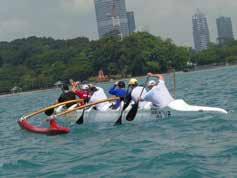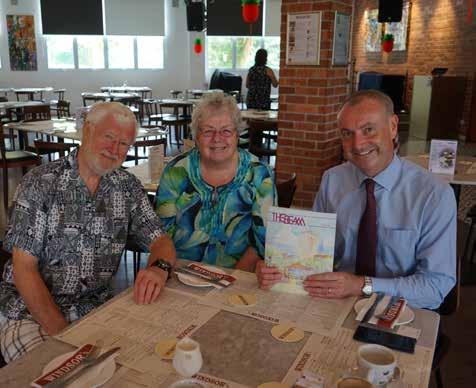
10 minute read
International Medical Clinic Article
CLUB NEWS A-Z OF HEALTH IN SINGAPORE
New to Singapore? The A – Z of Health in Singapore by International Medical Clinic tells you all you need to know about Health in Singapore.
O is for Orthorexia. Characterized as a harmful obsession with ‘healthy’ eating, orthorexia is a new and concerning eating disorder often found in teens. If you are concerned, see a trusted doctor.
P is for Pregnancy. Locate a trusted Paediatric doctor who can guide you through, and remember you don’t have to take the paediatric doctor assigned to you at the hospital.
Q is for Quality. The Singapore Health system is of a very high quality – so you can be assured, you are in very good hands.
R is for Respiratory problems. There is a high prevalence of respiratory issues in Singapore, including coughs, colds, asthma and haze related breathing issues. Be prepared and register with a trusted Doctor clinic before you get sick!
S is for Screenings. Annual Health Screens are important to optimize your well-being, identify conditions that are asymptomatic and screen for certain cancer where early detection can mean a better outcome or cure. Health screens should be tailored to your medical needs and any significant family history or risk factors you have should be taken into account during your consultation. Don’t put them off, protect your health. T is for Tropical ear. Year-round swimming together with a humid environment can create the ideal conditions for ‘swimmers ear’. This is an infection of the ear canal caused by bacteria or fungi, see your doctor if your ear hurts for more than 2 days.
U is for Urinary tract infections. Urinary tract infections typically occur when bacteria enter the urinary tract through the urethra and begins to multiply in the bladder. In this hot and humid environment, it is important to drink lots of water and seek medical support if you start to notice symptoms.
V is for Vaccines. Here are the routine vaccines highly recommended for life in Singapore: • Diptheria/Tetanus/Pertussis (DTP) • Polio • Haemophilus influenza Type B • MMR • Hepatitis A & B • BCG (against TB) • Pneumococcal • Dengue (if you have contracted dengue before) • Flu
(And don’t forget that if you are travelling around Asia, additional vaccines may be recommended).
W is for Water. The water supply in Singapore is of a high quality, suitable for drinking and is optimally fluorinated. Remember to drink plenty of water in this hot, humid climate.
X is for eXterminate mosquitos! You may have noticed that many of the unpleasant viruses in Singapore are spread through mosquito bites. The best protection is to wear insect repellent and avoid getting bitten.
Y is for Yellow Fever. Yellow fever is a serious, potentially deadly flu-like disease spread by mosquitoes. It is characterized by high fever and jaundice. Jaundice is yellowing of the skin and eyes, which is why this disease is called yellow fever. This disease is most prevalent in certain parts of Africa and South America. It isn’t curable, but you can prevent it with the yellow fever vaccine. IMC is one of the few designated clinics in Singapore that can give the vaccine.
Z is for Zika: The virus is transmitted to humans by the bite of an infective Aedes mosquito. Singapore’s first Zika outbreak occurred in August 2016; however, there has been a low incidence since that peak. Try to avoid getting bitten.
International Medical Clinic has 30 internationally trained family practitioners and paediatric doctors who speak over 10 languages. Based in East Coast (IMC Katong), Orchard (IMC Camden and IMC Children’s) and Holland (IMC Jelita). www.imc-healthcare.com


British Club Members take on a challenge to set a Singapore record and raise funds for charity!



On 13 and 14 March, six members of the British Club (Andrew Hare, Geoff Lambrou, John Ewington, Matt Bird, Matthew Jackson, and Mike Garrison) will take to the ocean to circumnavigate the Singapore island in outrigger canoes and set a Singapore Book of Record!
The Aon Singapore 2020 Round the Island Challenge involves a group of 32 executives from the Asian insurance industry, with the objective to complete the challenge whilst pushing their limits as they endure testing sea conditions on the verge of exhaustion with no sleep.
Their motivation..? In addition to the camaraderie and satisfaction of participating in a unique endurance event, the team is raising funds in support of The Nicholson Memorial Fund (AN), established in Singapore by Ben Nicholson following the tragic loss of his wife and children - Anita, Alex and Annabel, in the 2019 Easter Sunday bombings in Sri Lanka. Ben will also be joining the team for the challenge.
Working in conjunction with The Atlas Foundation (the charity founded by rugby legend, Jason Leonard, to improve the lives of the most underprivileged children in the world through sports), The Nicholson Memorial Fund (AN) will use the funds raised to create a programme to support the poorest children in Sri Lanka, as well as programmes here in Singapore.
Please join The British Club in wishing the team well for their upcoming challenge, and all the best for their fundraising efforts!
If you would like to support their fundraising efforts, please visit bit.ly/39Ee1fL or scan the QR code.
Throwback to the 90s
We managed to catch up with past Members - Ian and Joan Lowe during their pit stop at Singapore, before they set sail on a cruise to India. Read on to find out more about them.
June 1990 saw the departure from Singapore, one of the Club’s most hardworking sub-committee Member, Joan Lowe. Joan and her husband Ian joined the Club shortly after they arrived in Singapore in July 1988.
Joan was a familiar figure around the Club. She was a tireless and cheerful worker who involved herself in so many different ways. As Chairman of the Children’s Committee and Member of the Activities and Magazine sub-committees, she started Mum & Babes, took charge of Coffee & Play on Friday mornings, taught arts and crafts to children on Wednesday afternoons, met new Members at Newcomers Coffee Morning and wrote endless articles for The British Club News. In additions, she organised junior tennis tournament and many family events like Family Night, May Day and Splash-out.
Ian on the other hand was previously the convenor for the squash team. Besides getting new Members to join the social squash evenings, he also held squash clinics for children who were keen to improve their game. Joan and Ian contributed greatly to the success of the Club, we were elated to welcome them back to the Club to reminisce about the early days here. They also brought with them a copy of the Club’s magazine from year 1990, which we managed to archive a scanned copy. Please let us know if you wish to have a copy, we will gladly email it to you.
We would like to extend our sincere gratitude to their contribution to the Club, and wish them a safe and pleasant trip.



Expat well-being: How to cope when your friends leave
Studies show that strong social connection is vital for greater health, happiness and longevity. So, how do you cope when your social connections are constantly splintering? How can you maintain a sense of wellbeing when you are continually saying goodbye to departing friends? There’s no magic bullet to alleviating the heartache of regular goodbyes, but there are steps you can take to mitigate the loss.

Here we go again. Contracts have finished. The farewell parties are over and once again, our carefully cultivated group of friends are been torn apart by relocation. It’s painful. It’s tedious, and it’s natural to want to become a hermit until this revolving door of friendships finally stops turning.
According to a survey conducted by Aetna International, the loss of a stable support network is one of the top three ‘pressure points’ for expatriates, and can be a major contributing factor in depression within expat communities. Therefore, as tiresome as the process may be, it’s imperative that you take conscious and constant steps to rebuild your friendship circles and social networks.
The first step is to deal most effectively with the grieving and goodbyes.
Dealing with the goodbye: Stiff upper lip, she’ll be right: we all know the phrases that imply that, if you’re feeling low, it’s best to just toughen up and get on with life. However, if you’re dealing with another sad goodbye, it’s perfectly normal for you to be experiencing a low mood and/or low energy. Therefore, allow yourself the freedom to feel what you feel*. Furthermore, it’s okay if you want to retreat for a while and give yourself time to recalibrate … just don’t make the break indefinite. Set a time frame (I’m going to lie low ‘til Easter; I’m giving myself six months to withdraw) and, ideally, get a family member or friend to hold you accountable. By creating a finite period for personal retreat, you will be better able to make the most of this rest time and you won’t wallow longer than what is healthy for you. Once your ‘retreat period’ is over, it’s vital you take bold steps to rebuild and reinvigorate your social circles. As emotionally exhausting as it can feel, don’t resist the opportunity to start socialising again – this may be as simple as inviting a new acquaintance for drinks, or reconnecting with familiar neighbours. (*If your low mood continues or deepens, you become unable to feel joy or happiness, or you develop anxiety or harmful thoughts, please seek help from a trusted medical practitioner. You are precious and deserve to be both happy and healthy.) see them sporadically. In time, as the social scene changes around you, you may find these casual connections are ready to develop into closer friendships. It’s also important to acknowledge the value of ‘local’ friendships. Studies show that expats who socialise with hometown locals tend to settle easier and enjoy greater long-term wellbeing. Therefore, whenever you can, make an effort to cultivate friendships with Singaporeans (and other permanent residents) and enjoy the relative stability of these nontransient connections. Knowing what you need: As you set about rebuilding your social connections, it’s wise to become more cognizant of your (ever-changing) friendship needs. In other words: be conscious of the type of friendship you are ready for and allow your social circles to evolve accordingly. If you’re grieving the farewell of a very close connection, you may not feel like being totally vulnerable and developing that kind of closeness immediately. Instead, you may benefit from more surface-level social connections. If you’ve been feeling isolated, it may be time to open yourself up for a close “bestie-type” relationship. There’s no need for judgement around the type of friendship you (or others) are needing at this time. The vital thing is to be honest with yourself and – if and when your needs change – allow your social circles to naturally evolve, to suit. Being there in support:
Preparing for social disruption: In addition to allowing yourself a healthy grieving process, there are everyday steps you can take to mitigate the painful disruption of departing friends. One important practice is to remain open to new friendships all the time. Sure, life may often be too ‘full’ for additional close friendships, but it can be incredibly valuable in the long-term to nurture acquaintances. Meet your neighbours, introduce yourself to familiar faces at the British Club, reach out to new arrivals, make an effort to extend beyond your familiar social circles. Pay particular attention to the people who make you feel good … even if you only Splintered social circles and sad goodbyes are ubiquitous and unavoidable faces of expat life. You can almost guarantee that every expat you see – at the mall, at school, at work, at the Club, at the playgroup – has felt the empty grief of a departing friend. Therefore, it’s our responsibility to be there for each other. If someone in your wider circle is losing a friend, reach out; make yourself available for a catchup; help create an environment of nurturing, compassion and support. A friendship may, or may not, bloom out of the interaction but – more importantly – you will have helped someone stay afloat through our shared experience of ‘revolving door’ friendships.







